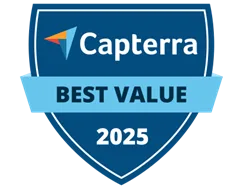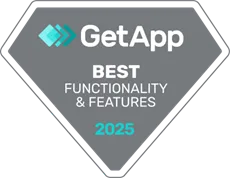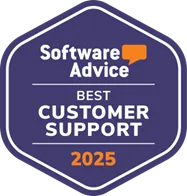A lot goes into planning an event for your organization—from booking the venue and keynote speaker all the way down to nitty-gritty details like creating the name badges.
A well-designed and informative event web page is pivotal to the success of your event. It’s where potential attendees can gather all the information they need to decide whether or not to attend and register for the event in one fell swoop.
Effective websites and event web pages help get the word out about events and boost registrations, and ineffective pages can result in lackluster event attendance. To fill the seats at your association or corporation’s next event, your event page should have as many of these six features as you can muster:
- Event Description & Details
- Eye- Catching Multimedia
- Calls-to-Action
- Registration Form
- Testimonials & Past Event Highlights
- FAQ & Contact Information
Let’s dive into how you can incorporate each one on your next event page
1. Event Description & Details
If you were going to attend this event, what would you want to know before registering? Provide a detailed description, along with any helpful information to paint a picture of the event for potential attendees.
This includes:
- Date and time
- Dress code
- Meal menus (if applicable)
- Parking information
- Ticket/registration cost
- Purpose of the event
- Entertainment/keynote speakers
- Event sponsors
As you’re putting your page together, make sure to highlight the elements of the event that will be most enticing to your audience. Have a buzzworthy keynote speaker? Share those details prominently on the page to encourage registrations!
2. Eye-Catching Multimedia
Colorful and engaging multimedia elements can make a web page stand out from the crowd and help potential attendees get a feel for what the event itself will be like.
Consider using a few different types of multimedia on your event web page to grab (and keep!) your audience’s attention, such as:
- A photo gallery of past event photos
- An infographic showing the schedule or purpose of the event in a visual way
- Venue maps to help your audience feel prepared and excited about the venue you’ve chosen
- Videos that offer a trailer-like sneak peek of the event
- Sponsor logos to keep sponsors and partners happy
Multimedia is also a great way to break up text on the page so visitors are not overwhelmed with a wall of text when they land on your event page. Visual elements help tap into people’s emotions and give the web page an overall aesthetically pleasing look and feel.
3. Calls-to-Action
Once you share the main event information and enticing visuals, it’s time to make your ask. Calls-to-action, such as “Save Your Seat Now” or “Register Today,” are quick and effective ways to close the deal after detailing the benefits of attending.
Your calls-to-action to attend the event should be clear and compelling to encourage visitors to take that next step and register. Follow these best practices for your event page’s calls-to-action:
- Let them know exactly what you’d like them to do.
- Keep your calls-to-action brief and easy to understand.
- Format your calls-to-action brief and easy to understand.
- Use urgent language (like “now” or “today”).
Additionally, pay close attention to the visual look of your calls-to-action. You want them to stand out from the rest of the information and features on the page so that you get people clicking on them!
4. Registration Form
To maximize attendees at your event, make the registration process as easy as possible for visitors to complete. This means housing the registration form directly on the event page, the place where they’ve made their decision to attend.
Be sure to also follow these form best practices:
- Keep the form short and simple, removing any unnecessary fields.
- Label each field and clearly flag incorrect or incomplete information.
- Mark additional fields as optional.
- Include a donation option for a digital fundraising boost.
- Ensure the form is mobile responsive to allow people to register from a range of devices.
- Provide a thank-you email and receipt to registrants.
Once your registration form is built, it’s time to test it. Go through the entire process, inputting a range of different responses, to ensure that the form works as you’d expect. It’s also important to test from various devices so that you can be sure the process works well on things like laptops and smartphones.
5. Testimonials & Past Event Highlights
Social proof in the form of testimonials and past event highlights is an excellent way to give an upcoming event more leverage. If potential attendees can see that others have attended similar events in the past and enjoyed themselves or found them to be helpful, they are more likely to attend themselves.
Sharing testimonials and highlights from past events can create feelings of tradition, legacy, community, and excitement. Visitors to the page will see what others have experienced and want those same experiences.
On your event page, you might share social proof in a variety of different ways:
- Quotes shared in text form on the page
- Testimonial Videos
- Photos of attendees or entertainment from previous events
- Video clips from past events
If you don’t have testimonials or photos and videos from past events, now is the perfect time to create a plan for collecting those elements at this upcoming event so you can use them to strengthen future event pages.
6. FAQ & Contact Information
Answering the same questions over and over again about your events can take up a lot of time, especially in the weeks or days ahead of the event when you’re trying to get things off the ground.
Combat the endless questions by including a list of FAQs right on your event page to address common questions or concerns. Here are some examples:
- Is there a preferred accommodation that I should book?
- If I register online, how do I collect my ticket?
- Is there a place to review my registration information?
- Is there a way to change my registration?
- Can I get a refund if I change my mind about attending?
- Can you accommodate special dietary restrictions?
- Will the venue be accessible for people using wheelchairs?
- Where can I find information about the event agenda and schedule?
For questions or concerns that still arise after the FAQs (and that’s inevitable), it’s important to include contact information or a contact form to allow registrants to get in touch with your team.
Event Web Page Design Tips
Now that you have all of the must-have event page features, it’s time to build a functional and great looking page on your website. Whether your nonprofit website uses WordPress or another content management system (CMS), you can follow these design tips to create an effective event page that checks all of the boxes:
- Incorporate your organization’s branding to make it clear that your organization is hosting the event.
- Optimize the page for mobile devices so that visitors can register from anywhere.
- Prioritize web accessibility so that visitors of all abilities can register for and attend the event.
- Incorporate whitespace throughout the page to prevent the page from feeling cluttered or overwhelming.
- Use visual elements like photos, videos, and graphics to add interest to the page and break up text.
- Format text with headings and lists to make content easy for online readers to scan and digest.
- Link to the web page throughout your website and other online content so that visitors to relevant pages on your site can find and register for the event.
- Add social media sharing buttons to your web page so that attendees can easily spread the word about the event.
You’re well on your way to a full house at your next event! The event page, and the information and visuals that are included on it, is often the tipping point for someone on the fence about an upcoming event. Following the best practices in this post can help you tip those odds in your favor.
Best of luck with your organization’s next event page!
Guest Author: Ira Horowitz




